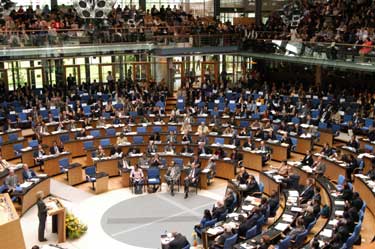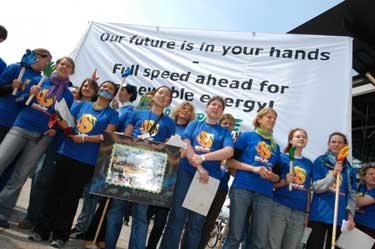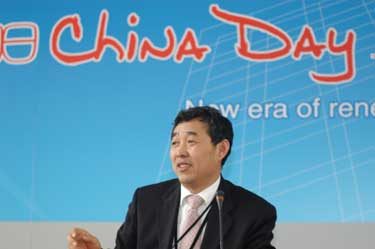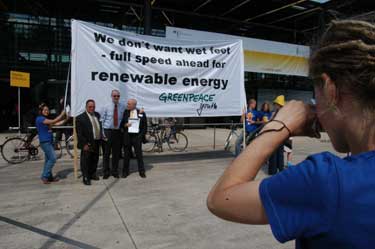Tiempo Climate Cyberlibrary
Renewables 2004
- Tiempo archive
- Complete issues
- Selected articles
- Cartoons
- Climate treaty
- Latest news
- Secretariat
- National reports
- IPCC
About the Cyberlibrary
The Tiempo Climate Cyberlibrary was developed by Mick Kelly and Sarah Granich on behalf of the Stockholm Environment Institute and the International Institute for Environment and Development, with sponsorship from the Swedish International Development Cooperation Agency.
While every effort is made to ensure that information on this site, and on other sites that are referenced here, is accurate, no liability for loss or damage resulting from use of this information can be accepted.
Newswatch editor Sarah Granich reports on Renewables 2004, a major international conference on renewable energy held in June 2004.
The International Conference for Renewable Energies, informally referred to as Renewables 2004, was held in Bonn, Germany, 1st-4th June 2004. With over 3,500 participants from 154 countries, the four-day event was a significant step forward in the promotion of the development and use of renewable energies.
Two of Germany's representatives, Environment Minister Jurgen Tritten and Development Minister Heidemarie Wieczorek-Zeul, declared at the conclusion of the conference that "the conference was a complete success. Together, the delegates have paved the way for a global transformation in energy structures and for a massive increase in the use of renewable energies. This will alleviate global poverty and protect the climate."
How much was, in fact, achieved?
There were three specific outcomes from the conference, which participants emphasized should be linked closely in any ensuing agreements or activities. These were a Political Declaration, an International Action Programme and Policy Recommendations for Renewable Energies. The full texts of these, together with further details on other conference documents and events, are available online.
|
|
Reproduced with permission: |
The Political Declaration contains definitions of common political objectives for the promotion of the role of renewable energies. It acts as a framework for shared political goals for the increased development and use of renewables and reflects the joint vision of a sustainable energy future which is intended to provide better and more equitable access to energy as well as increased energy efficiency.
|
Commentary on the Political Declaration by participating members from the International Network for Sustainable Energy (INFORSE) The political declaration has a number of good points, such as underlining the need to remove barriers for renewable energy and internalizing environmental costs in energy prices. It also states that the World Bank and other development banks should significantly expand their investments in renewable energy and energy efficiency. Further, the countries agreed to work within a "global policy network" and to take renewable energy issues to meetings of the United Nations Committee on Sustainable Development that will focus on energy in 2006 and 2007. The declaration does not include targets for renewable energies nor for lending or assistance to developing countries. The countries only "took note" of the fact that some countries have national targets. A point of reference here is that the term "take note" is the lowest-ranking positive phrase in diplomatic terms. Neither the declaration nor the conference initiated any new international organization for renewable energy, although this perceived need was supported in several side events. Regarding poverty reduction, the countries reaffirmed the Millenium Development Goals and found that up to one billion people could get access to energy via renewables but this was not followed through with any agreed target. This could be reached though, through market development and financing as well as through initiatives within the International Action Programme. |
There were a number of agreements made to further cooperation and development in various additional discussions throughout the conference. Germany, for example, signed letters of intent with both Denmark and Brazil. Denmark and Germany intend to cooperate closely on offshore wind energy research. The agreement with Brazil concerned fees for the feed-in of electricity from renewable energies into the grid.
|
|
Reproduced with permission: |
Germany also signed to a strategic partnership agreement with the Inter-American Development Bank. This cooperation agreement is to promote renewable energies and increase energy efficiency in Latin America and the Caribbean. It is hoped that this cooperation will provide additional impetus on both sides in order to further intensify existing activities in Latin America and the Caribbean in line with the conference goals as well as designing them more effectively as part of broader policy approaches.
|
|
Reproduced with permission: |
The second major outcome from the conference, the International Action Programme, includes actions and commitments by governments, international organizations and stakeholders. Conference participants were invited to contribute to the action programme with voluntary commitments to goals, targets and actions within their own spheres of responsibility. To date, well over 100 proposals for voluntary measures have been endorsed and other submissions for action are currently being screened.
|
Commentary on the International Action Programme by INFORSE The International Action Programme is a catalogue of more than 150 national and international activities to support renewable energy. Many of the activities are small, such as the Danish-German agreement on environmental impact assessment of offshore wind parks. Others, though, are larger such as the World Bank's pledge to increase renewable energy lending by 20 per cent. Perhaps the most outstanding was the Chinese goal of expanding renewable energy to 10 per cent by 2010 and the Philippines goal of doubling renewable energy use by 2013. |
The third official outcome, Policy Recommendations for Renewable Energies, aims to provide practical advice on how to promote the development of markets for renewable energies throughout the world. It is intended that these recommendations be of benefit to governments, international organizations and stakeholders as they develop new approaches and political strategies and address the roles and responsibilities of the key players.
|
Commentary on the Policy Recommendations by INFORSE The Policy Recommendations for Renewable Energies is a 19 page document that countries 'took note of with appreciation'. This particular phrase is the second-lowest positive phrase used in diplomatic terms. The document contains recommendations on how to make the market and international finance work for renewable energy and about the roles of governments, intergovernmental organizations and other stakeholders. It urges the United Nations system to clearly define roles for renewable energy. It also urges the World Trade Organization to promote renewables and urges development banks and development cooperation agreements to increase funding for renewable energy and for there to be, in general, a strengthening of all cooperation for renewable energy development. |
The additional side events at Bonn were many and varied. The Climate Alliance initiated a climate relay race intended to highlight the need for climate protection and the need for greatly expanded use of renewable energies throughout the world. The climate relay race, with the help of local and regional governments and non-governmental organizations, was undertaken by runners, cyclists, horse riders, inline skaters and rowers. After 4,000 kilometers the baton was handed over to Germany's Environment Minister Jurgen Trittin.
Water activists organized the presentation to Germany's Development Minister Heidemarie Wieczorek-Zeul of a 'message in a bottle'. Standing at around six feet tall the bottle contained 35,000 postcards from people appealing to the government to promote the right to water in the national and international political arena.
|
|
Reproduced with permission: |
One of the most prominent non-governmental organization groupings was the Citizens United for Renewable Energy and Sustainability network, otherwise known as CURES. CURES is intended to act as a united grouping of international organizations so as to coordinate activities and involvement through specific international events and conferences. As such, CURES will follow the resulting activities and outcomes from Renewables 2004 through negotiations leading to the United Nations Commission on Sustainable Development meetings over 2006/7.
|
Commentary on the response of non-governmental organizations by INFORSE While non-governmental organizations in general were content with the push that the conference gave to renewable energy and sustainable development, many of the expectations were not met and some felt it was a missed opportunity for more commitments for faster development. A number of individual countries were prepared to go further than the conference declaration expresses. A number of developing country non-governmental organizations, including INFORSE members, felt that the conference had a less than expected focus on energy for rural development and poverty reduction. This was both in the conference and in the exhibitions. The risk is that the focus on large-scale implementation of renewable energy will outweigh locally based solutions. This is in both regarding technologies, where central supply and photo-voltaics tend to dominate over locally made renewable energy solutions, and in the implementation, where involvement of non-local companies increases the risk of lack of maintenance and follow-up, leading to a short lifetime for the solutions. Non-governmental organizations must pursue and follow-up the progress on these issues. |
One of the liveliest and perhaps the most illuminating of the many events was the Multi-Stakeholder Dialogue. It was seen as an important and critical instrument for a transparent conference, enabling a wide range of interest groups to be involved. These stakeholders included representatives from non-governmental organizations, actors in the fields of development cooperation and poverty alleviation, representatives from municipalities and regional bodies and unions and financial sectors, as well as manufacturers and suppliers to the renewable energies sector.
It was observed that 'transparent dialogue' such as this should be undertaken much more frequently with as broad a range of stakeholders as possible if the development in the use of renewable energies is to make any significant impact on the global arena.
Further information
International Network for Sustainable Energy, Gl Kirkevej
82, DK-8530 Hjortshoej, Denmark. Fax: +46-86-227096. Email:
inforse@inforse.org. Web:
www.inforse.org.
On the Web
The Renewables 2004
website contains further information on the outcome of
the conference and related events. INFORSE, the
International Network for Sustainable Energy, produces a
quarterly newsletter, Sustainable Energy News. The
Tiempo Climate Cyberlibrary provides a listing of
theme sites on renewable energy.
Acknowledgements
We thank conference participants from the International
Network for Sustainable Energy for their comments on the
meeting's outcomes.
Bright Ideas

General Electric plans to cut solar installation costs by half

Project 90 by 2030 supports South African school children and managers reduce their carbon footprint through its Club programme

Bath & North East Somerset Council in the United Kingdom has installed smart LED carriageway lighting that automatically adjusts to light and traffic levels

The United States National Oceanic and Atmospheric Administration and the American Public Gardens Association are mounting an educational exhibit at Longwood Gardens showing the link between temperature and planting zones

The energy-efficient Crowne Plaza Copenhagen Towers hotel is powered by renewable and sustainable sources, including integrated solar photovoltaics and guest-powered bicycles
El Hierro, one of the Canary Islands, plans to generate 80 per cent of its energy from renewable sources

The green roof on the Remarkables Primary School in New Zealand reduces stormwater runoff, provides insulation and doubles as an outdoor classroom

The Weather Info for All project aims to roll out up to five thousand automatic weather observation stations throughout Africa

SolSource turns its own waste heat into electricity or stores it in thermal fabrics, harnessing the sun's energy for cooking and electricity for low-income families

The Wave House uses vegetation for its architectural and environmental qualities, and especially in terms of thermal insulation

The Mbale compost-processing plant in Uganda produces cheaper fertilizer and reduces greenhouse gas emissions

At Casa Grande, Frito-Lay has reduced energy consumption by nearly a fifth since 2006 by, amongst other things, installing a heat recovery system to preheat cooking oil
Updated: May 15th 2015



